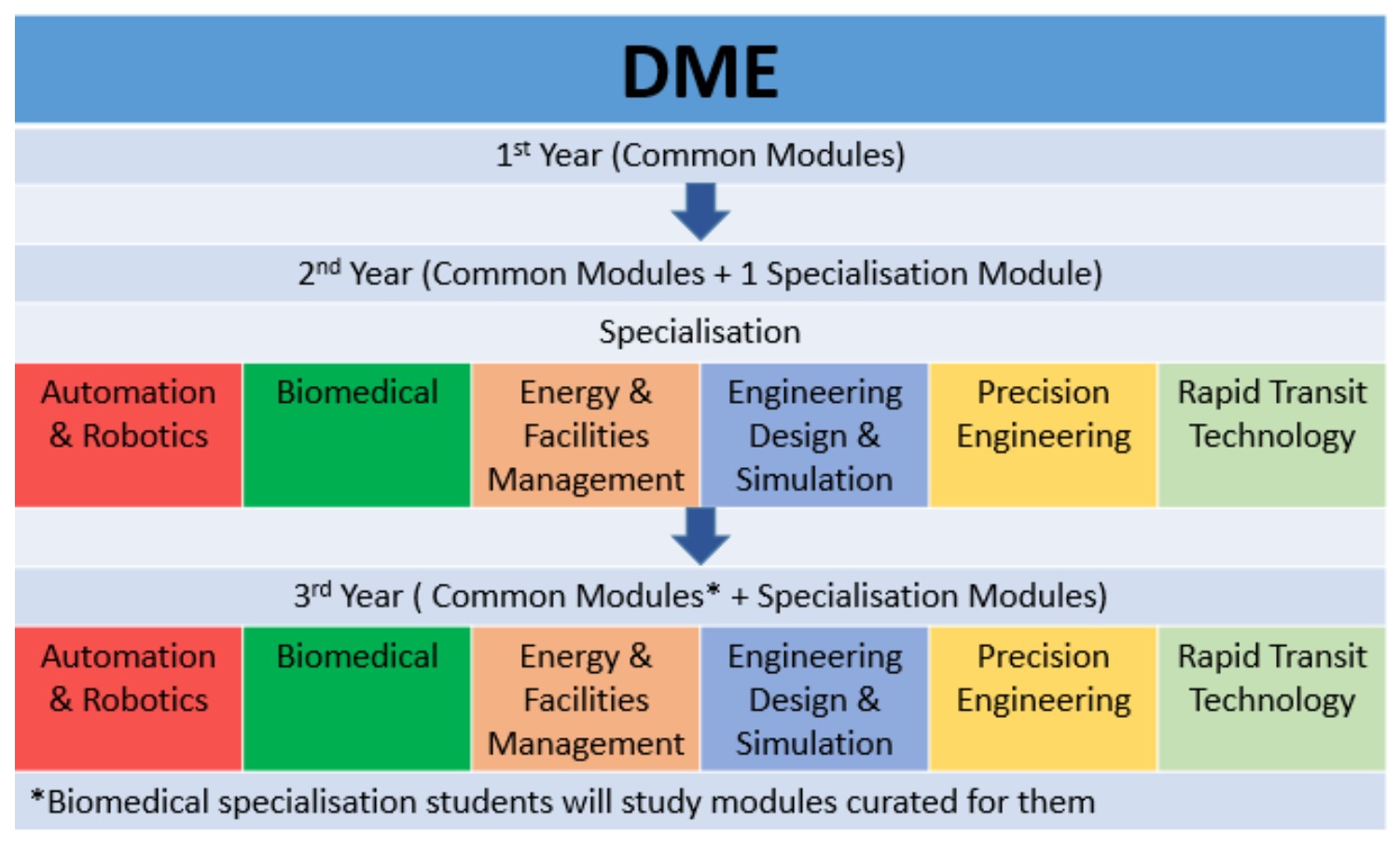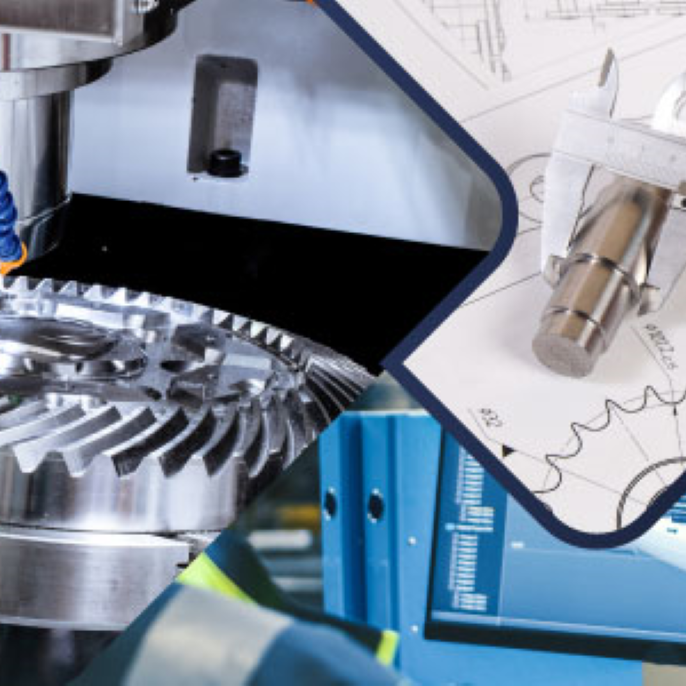The Diploma in Mechanical Engineering (DME) at SP is ideal for problem solvers and logical thinkers. With SP's longstanding history, cutting-edge facilities, and industry partnerships, you'll gain hands-on experience and develop skills to excel across sectors, all while learning to prioritise sustainable engineering practices. Become a capable engineer ready to impact the future. Start your journey with SP today.
In addition, you will graduate with a Minor upon the completion of a suite of related elective modules. SP offers 6 Minors for you to choose from:
Please note: Course structure is subject to change.
Electives
The SP elective framework offers students options to pursue their passion and/or meet different career needs, and is an integral part of the holistic education we seek to provide to our students.
Learn about SP Elective Framework
The Common Core Curriculum (CCC) prepares you for a changing world with essential human and digital skills. Through its 10 modules, the CCC also provides a wide learning experience to examine local and global issues based on the Sustainable Development Goals (SDGs). These modules help you understand real-world issues and the impact on different communities, and equip you with skills to create a better, sustainable Singapore and world.

Building a Strong Foundation
Establishing a strong base through fundamental modules in domains related to mechanical, electrical, electronics, and programming. These modules cover essential concepts and software skills, providing a solid groundwork for your specialised studies ahead.
Expanding Your Expertise
Explore specialised fields and the Sustainable Innovation Project (SIP) that hones your ability to create solutions for real-world challenges. You'll also receive training in personal branding and career agility.
Starting in Year 2, DME students will specialise in 1 of the 6 listed specialisations.
Gaining Real-World Experience
Empowering you to innovate by engaging with industry through a 22-week internship or a Final Year Project (FYP), allowing you to apply your knowledge in real-world settings. These experiences will equip you with the skills needed to meet industry standards and gain valuable insights into professional practices.
By the end of Year 3, you’ll have the skills and confidence to excel in the mechanical engineering field.
Please note: Course structure is subject to change.
Electives
The SP elective framework offers students options to pursue their passion and/or meet different career needs, and is an integral part of the holistic education we seek to provide to our students.
Learn about SP Elective Framework
The Common Core Curriculum (CCC) prepares you for a changing world with essential human and digital skills. Through its 10 modules, the CCC also provides a wide learning experience to examine local and global issues based on the Sustainable Development Goals (SDGs). These modules help you understand real-world issues and the impact on different communities, and equip you with skills to create a better, sustainable Singapore and world.
Learn about Common Core Curriculum

What are the eligibility requirements for mechanical engineering?
Applicants should not be suffering from severe vision deficiency, acute hearing impairment or uncontrolled epilepsy. Interested applicants with any of these condition(s) are advised to contact Singapore Polytechnic for more information.
You must meet the following criteria to qualify for the Diploma in Mechanical Engineering:
If you excel in problem-solving, logical thinking, and attention to detail, mechanical engineering is ideal for you. This course is perfect for curious and analytical minds who enjoy experimentation. These traits, combined with the technical knowledge from this diploma, will help you master complex projects and drive innovation using the latest technology.
SP offers many scholarships to recognise talent and service, from Year 0 to after graduation. These scholarships provide tuition fee waivers and chances to represent SP. They are awarded for academic excellence, contributions to arts or sports, and community service. Edusave awards and external sponsorships are also available.

Mechanical engineering at SP prepares me for the future.
At SP, you’ll access modern facilities that keep pace with industry trends. In the Advanced Manufacturing Centre (AMC), you'll work with smart machining lines. The Automation Lab lets you dive into robotics, and the Digital Fabrication TechCentre sharpens your design skills. These advanced facilities ensure you're equipped with industry-relevant skills, preparing you to excel in the future.
Mechanical engineering at SP prepares me for Singapore.
Mechanical engineering is essential for developing infrastructure and technology. Many think mechanical engineering is just about heavy machinery, but it’s also about smart and sustainable solutions. In 2025, AI and digital technologies are transforming this field. SP equips you with the skills to master these advancements.
Mechanical engineering at SP prepares me for the world.
There are many niche fields within mechanical engineering. At SP, you can choose from these specialisations:
These specialisations offer hands-on experience and prepare you for diverse careers in mechanical engineering.
SP students have embarked on internships at startups, SMEs, MNCs, and government agencies. They experience a 22-week internship. Mechanical engineering students have interned at companies like A*STAR, Panasonic, Siemens, LionsBot, and SMRT. Some interns made significant contributions, outperforming their university counterparts. For example, one intern started as a Quality Assurance Engineer at LionsBot and later secured an advanced role. These internships provide valuable industry experience, helping you make an impact.
Internships provide industry networking, career insights, and job opportunities. SP offers coaching to boost confidence and employability. Experiencing multiple internships broadens your perspective, leading to informed career decisions. Benefits include higher starting salaries, business exposure, and professional growth through meaningful work, learning opportunities, and mentor support.
Overseas exposure helps broaden your horizons. Understanding globalisation and working with diverse cultures is important in a global city like Singapore. Mechanical engineering students and alumni have experienced international internships and exchanges, enriching their worldviews and career prospects. Students in other CCAs also have opportunities to represent Singapore abroad and gain international experience.
We know some of you want to push yourself further and take on more challenges. Stepping out of your comfort zone and being more active can help. Past students have participated in and won awards in high-profile competitions like the WorldSkills Competition in Engineering and ASEAN Skills Competition. These achievements boost your confidence by testing your skills and determination. Competing helps test your knowledge and build your confidence.
Many SP graduates further their education with degrees that complement their diploma. Alumni have pursued degrees in Mechanical Engineering, Aerospace Engineering, Renewable Energy, and Industrial Design. Common undergraduate degrees include:
If you’re preparing for university and want to make the most of your diploma time, an SP diploma can let you fast-track your education by 0.5-2 years!
DME Gold Medallist | Chua Chor Teck Gold Medal recipient | NTU ASEAN Undergraduate Scholarship recipient | Class of 2019 The knowledge I acquired in DME allowed me to brand into many different interest areas and the course also provided me with a wide range of skills I need to succeed in the working world.

DME Graduate 2021 | As a Quality Assurance Engineer interning at LionsBot, I work closely with the production team. My role involves identifying and investigating issues in the assembled components of the robots, requiring versatility and precision. Additionally, I assist the production manager in documenting detailed work instructions and inspection manuals, utilising my in-depth knowledge of the robots' operation.

